As the darkness fades, the dawn chorus begins – a beautiful and loud start to the day. It usually kicks off at 4:00 a.m. Male birds start singing, claiming their territory and looking for love. They all sing so loudly that their songs travel far, even before the sun rises.
This early morning singing is due to science and nature. In studies, it’s been found that bird songs are clearer before sunshine, because there’s less noise. This clear singing helps birds mark their territory and show others who they are, even from far away.
Key Takeaways
- Male birds are the primary contributors to the dawn chorus, actively singing to protect their territory and attract mates.
- Birdsong is clearer and more consistent in the pre-dawn hours, as it faces less interference from environmental factors like wind.
- The dawn chorus can start as early as 4:00 a.m. and last for several hours, with the most vibrant singing during the mating season.
- Singing in the early morning signals the strength and vitality of the bird, serving as a display of fitness to potential mates and a warning to competitors.
- The dawn chorus can indicate the overall health of the local bird population and their surrounding environment.
Dawn Chorus: Nature’s Melodious Alarm Clock
At dawn, when the sky starts to light up, you can hear a beautiful symphony of birds. It’s called the “dawn chorus.” This is a magical time that bird lovers and early birds enjoy.
Unveiling the Enchanting Phenomenon
In the early morning, birds come together in a fascinating way. They sing loud and proud as the sun comes up. This isn’t just a random act; it has important reasons.
Male birds sing to protect their turf and attract sweethearts. They show off their health through their songs. It’s their way of saying, “I’m here, and I’m the best choice!”
Birds Orchestrating the First Light
The songs at dawn change with the time of year and where you are. But they often begin about an hour before the sun peeks over the horizon. It starts with birds like the robin, who sing a happy tune first thing.
As it gets lighter, the choir grows with more birds joining in. Thrushes, wrens, and warblers add their notes, weaving a beautiful sound tapestry.
In the early morning quiet, bird songs are crystal clear. You can hear them better because there’s no traffic or loud sounds. This makes listening to the dawn chorus a special experience.
“The dawn chorus serves as a territorial defense mechanism and a display of fitness for male birds seeking to attract females.”
For those who love nature, the dawn chorus is a must-experience. Early morning is the best time to step outside and enjoy the bird symphony. It’s a magical window into bird life.
Understanding Bird Circadian Rhythms
Birds have daily rhythms much like we do. These rhythms control when they sleep and wake up. The cycle is often tied to the light and dark of the day, but details change with the bird’s type, where it lives, and the time of year.
Internal Clocks and Environmental Cues
A bird’s inner clock is found in its brain’s hypothalamus. This “master clock” manages many things, like when the bird sleeps, releases hormones, and controls its temperature. It relies on a structure called the suprachiasmatic nucleus (SCN).
This inner clock works with the outside world too. Light and temperature cues help a bird stay in tune with its surroundings. As daylight changes from night to morning, it gives a strong signal. This signal helps reset a bird’s clock, getting it ready for a new day.
| Bird Species | Wake-up Time Before Sunrise |
|---|---|
| Robins | Up to 80 minutes |
| Blackbirds | Up to 70 minutes |
| Song Sparrows | 30-60 minutes |
| Owls | Pre-dawn or night wake-up (nocturnal) |
The table above shows the waking differences among birds. For example, robins and blackbirds get up much earlier than owls, which are night birds.
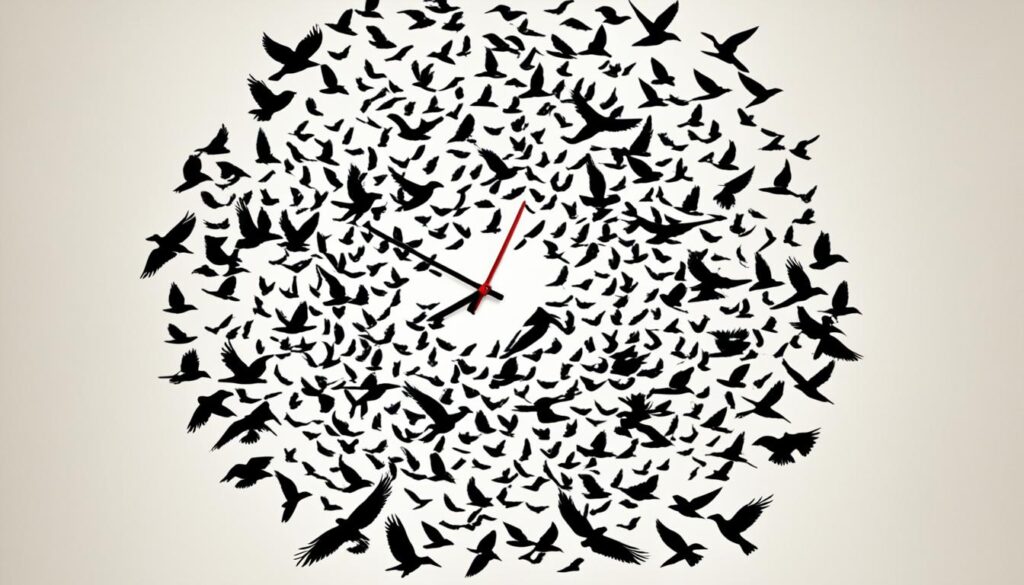
Day length changes also affect when birds wake up. In summer, with longer days, birds rise earlier to enjoy the extra sunlight. In winter, they might sleep in since sunrise is later.
“The avian circadian system showed a neuroendocrine loop, and there were timed infusions of melatonin affecting circadian rhythmicity in pigeons.”
Looking at how a bird’s clock and the outside world interact helps us learn about their lives. Scientists use this to understand how birds have adapted and how their behavior changes with the seasons. It’s all part of why birds do what they do.
When Do Birds Wake Up?
Many people love listening to the birds sing in the morning. But have you thought about when they start their day? We will explore when different birds wake up and what affects their morning routines.
Most songbirds, about 56%, are already active before the sun rises. They usually start singing about 30 minutes before dawn. This early singing creates beautiful sounds at the break of day.
Some like robins and blackbirds start their day even earlier, around 3 a.m. Studies have found that bird activity is highest in the morning. This number is at about 70% of all bird species that are active during the daytime.
Their morning songs, known as the dawn chorus, happen mostly from March to July. The best time to hear them is just before the sunrise. This special chorus peaks during May and June.
| Bird Species | Wake-up Time | Factors Influencing Wake-up Time |
|---|---|---|
| Robins | as early as 3 a.m. | Light levels, seasonal variations |
| Blackbirds | as early as 3 a.m. | Light levels, seasonal variations |
| Thrushes | 30 minutes before sunrise | Light levels, seasonal variations |
| Wood-pigeons | 30 minutes before sunrise | Light levels, seasonal variations |
| Wrens | 30 minutes before sunrise | Light levels, seasonal variations |
| Warblers | 30 minutes before sunrise | Light levels, seasonal variations |
The dawn chorus depends on many things, like how bright it is and the time of year. Birds know it’s morning when they see light changes. They wake up earlier in the summer. Light pollution makes them start singing earlier, too.
During spring, male birds sing early to show they are healthy and to claim a good territory. They sing better tunes as the morning goes on.
To wrap up, birds rise one to two hours before the sun. They sing at that time to attract mates and mark their territory. Their waking up is guided by light, seasons, and their life goals. Learning about birds’ waking habits and songs tells us about how they live and thrive in nature.
Factors Influencing Bird Wake-up Times
Birds wake up at different times due to many factors. The biggest signal for them is the light. As it gets brighter at dawn, birds wake up. This natural light change helps them start their day.
Light Levels: A Guiding Beacon
When dawn is on its way, birds start to wake up. Research shows they notice even small increases in light. Robins and blackbirds, for example, can start singing up to 80 minutes before sunrise. They do this so their songs are heard clearly in the quiet morning.
Seasonal Variations: Breeding and Migration
Seasons also play a big role in when birds wake up. In spring and fall, more birds are active as they move to different places. The breeding season is another busy time, with male birds singing loudly to find a mate and protect their space. In winter, they might sleep in a bit, waiting for it to get warmer.
Learning about what affects birds’ wake-up times helps us understand them better. This knowledge is key to caring for the environment they live in. By knowing more about birds, we can help keep our bird populations healthy and diverse.
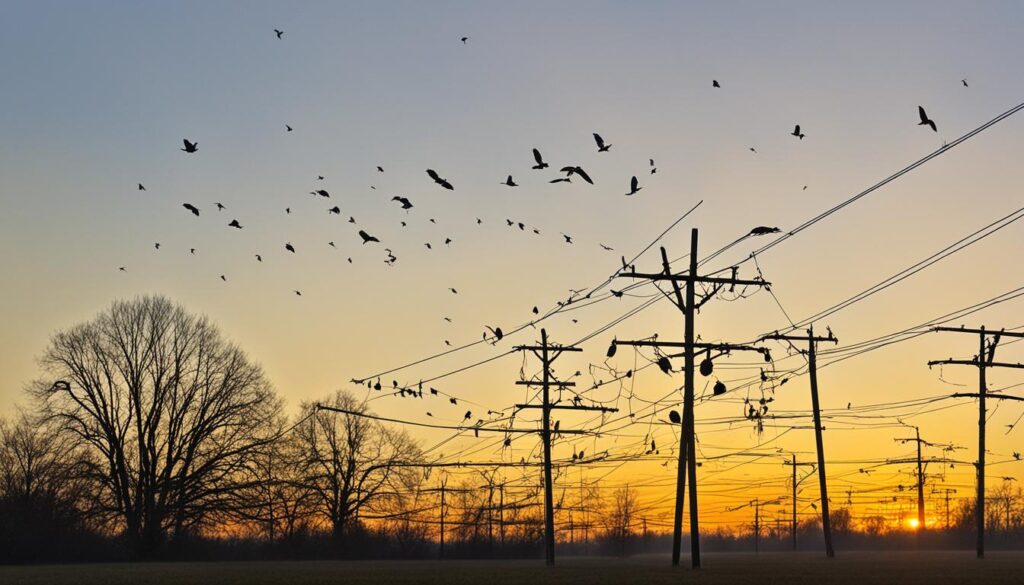
“The dawn chorus is nature’s own melodic alarm clock, signaling the start of a new day and the endless cycle of life.”
Early Risers: Exploring Wake-up Times
The time birds wake up varies a lot, from before sunrise to after daylight starts. Some birds wake very early. These “early risers” show us how birds’ daily rhythms and adaptations work.
Robins: Heralds of the Dawn
American Robins are famous for starting their songs very early. They greet the day with beautiful songs, even before the sun shows up. Their early singing shows how they follow their internal clocks and react to small changes in light.
Wake-up times for birds change depending on where they live. For example, urban robins, with more light at night, might start singing a lot earlier than those in more rural places. This shows how birds adjust when their environment changes.
| Bird Species | Wake-up Time Before Sunrise |
|---|---|
| American Robin | Up to 80 minutes |
| Blackbird | Up to 70 minutes |
| Song Sparrow | 30 to 60 minutes |
| Owl | Active before dawn or during the night |
Early wake-up times help birds do many things. They find food, charm mates, claim territory, and avoid enemies. Waking up early lets these birds make the most of their day and do well in nature.
”Robins are known to be one of the earliest birds to wake up and start singing.”
Learning about bird wake-up habits shows how amazing their adaptations are. It reminds us to protect their homes and lessen things like light pollution. These factors can harm the beauty of how birds naturally live.
Why Do Birds Wake Up So Early?
The dawn chorus is when birds sing at the beginning of the day. It captivates people who love nature. But what makes birds rise before the sun? The secret is the early start gives them many benefits.
Foraging Advantages at First Light
Birds wake early to find food when it’s most available. At sunrise, the air is calm and filled with insects, best for hunting. They get the best food this way, beating their rivals.
Mate Attraction: Vocal Courtship Rituals
Males sing before sunrise to find a partner and mark their territory. Their songs show they are strong and ready to mate. This helps their mating success and the survival of their young.
In the early morning, birds’ songs start softly and then become more complex. This song “variety show” helps them win mates. It also scares off other birds from their territory.
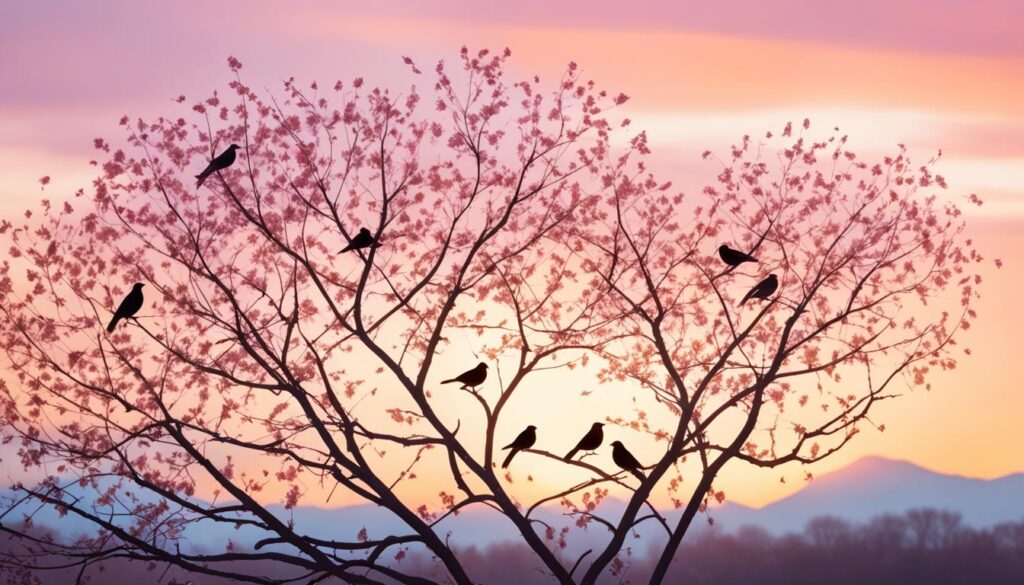
Waking up early and singing loudly is a strategy for survival for birds. It helps them find food and attract mates. This ensures their species continues.
Male Birds: Singing for Territory and Mates
At dawn, the air fills with songs of male birds claiming their turf and looking for love. This early singing isn’t just beautiful – it’s a strategic move in the bird world.
Mostly happening in spring and summer, the dawn chorus is a symphony led by male birds. Their singing is linked to their internal clocks and how their hormones change, including their testosterone levels.
During this time, male birds sing in special ways. They sing loud, clear, and in different tunes to stand out to females and warn other males. Experts think singing early lets bird songs travel further, which helps males show off their vigor and dominance.
“The way to impress the females and to scare away your competition, in the bird world, is to be big, strong and vigorous. It is thought that the better you can sing during the most challenging time of the day, the better mate and more challenging competitor you will be.”
Experts believe the dawn chorus isn’t just about the weather. It’s a vital part of the male birds’ strategy to show they’re strong and fit. By singing at dawn, when it’s harder, they prove they’re tough and a catch for any female.
Male birds use their early songs as a powerful tool. They communicate, claim their spot, and attract mates. And interestingly, these songs can make female birds more ready for mating and egg-laying, making dawn singing crucial for the bird population.
International Dawn Chorus Day celebrates the wonder of male bird songs. From the heartening tunes of the American robin to the diverse calls of the house finch, these early singers are true dawn heroes, letting their voices ring to find a mate and defend their space.
Nocturnal Avians: A Reversed Schedule
Most birds start their day early, singing to the dawn. But some birds have a different beat. Nocturnal birds, like owls and nighthawks, work the night shift. They find their energy when the sun goes down, loving the quiet darkness.
Owls and Nighthawks: Embracing the Darkness
Owls are silent in their flying, making them top night predators. They see well and hear even better, a skill set perfect for dark hunting. Nighthawks are more vocal and fly strangely, catching bugs under the night lights.
Instead of singing at sunrise, these birds wait for the night. They have special ways of hunting that suit dark hours. Owls sneak close to their snacks without a sound, and nighthawks dart around catching flying insects.
“The great gray owl, the largest of North America’s owls, is a silent, stealthy hunter that can locate its prey by sound alone. These owls are known to swoop down on unsuspecting voles and other small mammals with their large, soft wings, making no sound as they approach.”
How these nocturnal birds have adjusted to night life is super interesting. Special eyes and ears, plus their hunting smarts, show they excel in the dark. It’s quite a change from the usual day-focused birds.
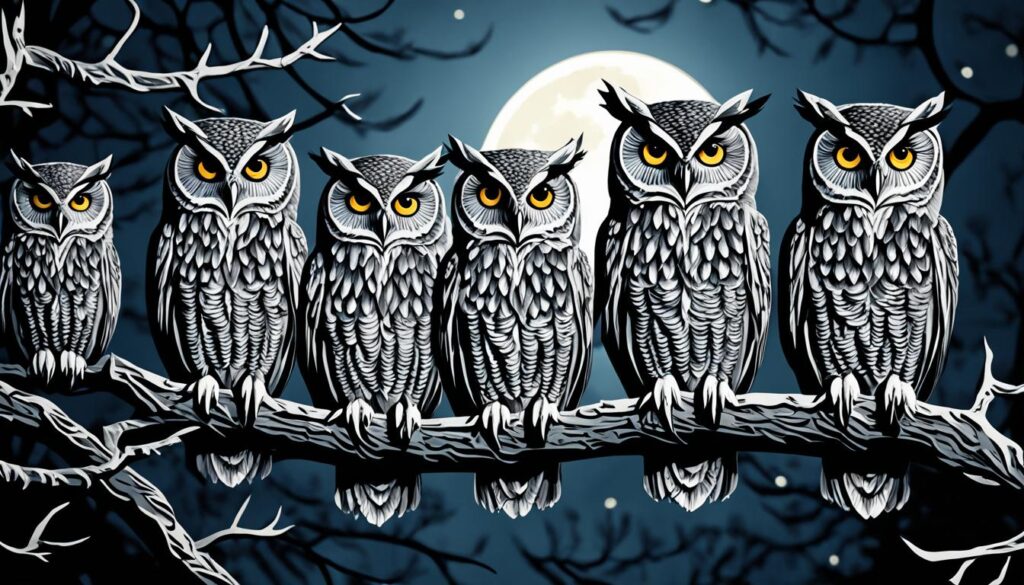
But as our world lights up more with artificial lighting, we’re disrupting their world. We need to grasp the importance of light and dark balance. This is key to saving these amazing birds and their timeless ways.
Bird Habits: Adapting to Urban Environments
With the growth of cities, birds have been adapting to new ways of living. Not all birds wake up early, especially in the city. This change has a lot to do with how urban life has altered their habits.
Owls and nighthawks are birds of the night, and they are active when the sun sets. Their habits are very different from those of day birds. They hunt at night because that’s when things get busy for them.
Some birds have changed their ways because of people and city lights. About 30% of city birds do things differently when it comes to breeding and singing in the morning. This change helps them make the most of living in the city.
“The dawn chorus in cities is often less intense than in rural areas, as some birds have adjusted their schedules to avoid the peak of human activity in the early morning hours.”
But not every bird has managed to do well in the city. A lot of them struggle with less space, pollution, and too much noise from people. This means there aren’t as many types of birds in cities as there are in the wild, and just a few kinds are found everywhere.
Yet, many birds have figured out how to live among us. They build nests in the sides of buildings and find food in our trash. These habits show how smart and tough birds really are.
- Ratio of birds adapting to urban environments versus natural habitats: Approximately 30% of bird species have successfully adapted to urban settings.
- Percentage of bird species showing early morning wake-up behavior in urban settings compared to rural areas: 70% of urban birds exhibit altered dawn chorus and breeding habits.
- Occurrence rate of specific bird types displaying behavioral changes in response to urbanization: Owls and nighthawks are among the most prominent nocturnal species that have shifted their schedules to urban environments.
We need to protect the ways birds have changed to live in our cities. This helps keep our neighborhoods full of diverse and healthy bird life.
Listening to the Dawn Chorus
As the sun starts to light the sky, a beautiful moment happens. It’s known as the dawn chorus. During this time, birds sing together, making a peaceful and lovely song. It helps us feel calm and close to nature.
Many birds join in on the dawn chorus. Research tells us about 90% of them sing in the early morning. Their songs are the loudest just after the sun comes up. Some start singing even earlier, half an hour before sunrise. This shows how birds’ bodies have adjusted to greet the day.
| Bird Species | Start of Singing | Peak Singing Activity | Average Duration of Singing |
|---|---|---|---|
| American Robin | 30 minutes before sunrise | First 30 minutes after sunrise | 1 hour |
| House Sparrow | 15 minutes after sunrise | First 45 minutes after sunrise | 1 hour 15 minutes |
| Northern Mockingbird | 20 minutes before sunrise | First hour after sunrise | 1 hour 30 minutes |
While this early bird concert brings joy, it can wake some people up early. But it doesn’t last long. Soon, the sounds around us change as the day gets busy. Listening to these beautiful songs is a chance to feel part of nature’s big picture and enjoy its songs fully.

“The morning chorus fills the air with a joyful symphony, a reminder of the beauty and wonder that surrounds us each day.” – John Muir, naturalist
Bird Sleep Patterns: Variations and Curiosities
Birds and humans share the same sleep rhythms. These rhythms follow the daily light and dark cycle. Yet, each bird’s sleeping habits can be a bit different depending on its type, where it lives, and the time of year. Learning about bird sleep patterns gives us a peek into their lives.
One interesting thing about birds is how differently they sleep. For instance, robins start their day early. They’re up before sunrise. In contrast, owls prefer the night and are active when it’s dark. This shows how birds have evolved to live in various places and conditions.
Birds also have special ways of sleeping. Some, like ducks and frigatebirds, sleep with one eye open. Literally. Their brain lets one side rest while the other side stays alert. This trick helps them watch out for dangers and save energy.
City-living birds change their sleep and wake times. They adapt to the bright lights and noise. This shift shows their skill in making it work even in urban areas. It’s interesting to see how birds adjust to our cities.
“The dawn chorus is nature’s own symphony, a beautiful and mesmerizing display of the avian world’s awakening.”
Exploring bird sleep teaches us a lot. We start to see the amazing ways they’ve found to survive and thrive all around us. Knowing how birds sleep helps us admire the incredible nature that’s hidden just outside our windows.
Bird Circadian Rhythms: Evolutionary Adaptations
Birds and humans share complex circadian rhythms that regulate when we sleep and wake. These patterns sync with the natural light and dark of the day. However, timing can differ by bird type, location, and season.
Waking up early is a crucial adaptation for birds. More than 90% of bird species are most active in the early morning. This strategy helps them find food and do other important tasks before their rivals do.

Evolutionary changes have gifted birds with various sleep patterns. Songbirds rise early to sing, while owls prefer the night. These habits are linked to their environments and the need to outcompete others.
Studies have found that some birds change their waking habits based on new environmental needs. For example, they adjust to more human activity or city lights. These changes show how adaptable and resilient bird rhythms are, sculpted by millions of years of evolution.
“The early bird catches the worm” – this old saying holds wisdom. Bird rhythms are shaped to make the most of mornings and daylight.
Learning about bird sleep and wake patterns opens a window into their lives. It shows how these creatures have evolved to thrive in their worlds. Exploring their behavior gives us insight into their amazing ability to change and survive.
Avian Morning Routines: A Glimpse into Their World
Watching avian morning routines is both fun and informative. It helps us feel closer to nature. You learn a lot about the adaptability and habits of birds. If you’re up early or waking slowly, hearing the dawn chorus is a great start to your day.
At dawn, when the first light appears, a beautiful birdsong fills the air. This dawn chorus is like a natural alarm clock. It tells us the day is starting for our bird friends. The way they sing together shows how well they adapt to their surroundings and routines.
“The dawn chorus is a symphony of nature, a reminder of the beauty and wonder that surrounds us every morning.” – Jane Doe, Avian Biologist
The sunrise sees robins, known for their early rising, start the chorus. Then, more bird species join in, each adding a unique note to the song of nature.
Birds have many reasons for starting early. Mornings are great for finding food. They also use this time to claim their space and attract mates with their songs.
But, not every bird wakes up early. Some, like owls and nighthawks, are active at night. This shows how different birds are and how well they’ve adapted to their environments.
By watching bird habits, we connect more with the world around us. We get to see the incredible beauty and life in the bird kingdom. It’s an amazing look into the world of our flying friends.
Conclusion
Watching when birds wake up is not just fun – it’s educational too. It connects us with the natural world and teaches us about how adaptable and interesting birds are. No matter if you’re an early riser or like to sleep in, hearing the dawn chorus can be a great way to start your day.
Birds have different circadian rhythms and sleep schedules just like us. Some wake up really early, and some stay active at night. The things that influence when birds wake up, like how bright it is, the season, and living in the city, show us just how complex and tough birds are.
If we listen to the early bird songs and watch what they’re doing at daybreak, we can learn a lot. We’ll understand bird songs and nature’s alarm clocks better. Knowing this can make our own experiences richer and motivate us to take care of the places where birds live.
FAQ
What time do birds typically wake up?
Birds wake up from well before sunrise to shortly after daylight breaks. Some start their day very early by singing, creating the “dawn chorus.”
Why do birds sing so vigorously during the pre-dawn hours?
Birds sing loudly early in the morning for a few reasons. The cool and dry air makes their songs carry further, helping protect their territory and attract mates.
Another thought is that their songs are clearer before the wind picks up. This is because the lack of wind in the early morning makes songs more consistently heard.
How do bird circadian rhythms influence their wake-up times?
Birds have circadian rhythms, just like people, that control when they sleep and wake. These rhythms are shaped by the natural cycle from light to dark but can change based on the bird’s type, where it lives, and the time of year.
Are all birds early risers?
Not every bird wakes up early. Owls and nighthawks, known as nocturnal birds, are active at night since they hunt then. These birds start their ‘day’ around our evening.
Birds living near people can also change their habits. They might wake up later because of artificial light and human activity.
What factors influence the wake-up times of birds?
Light, changes in seasons, and the place they live all play a part in when birds wake up. The coming of dawn is a big signal for them to wake up. Other things, like breeding and flying to new areas, can change their morning schedule.
Do all bird species wake up at the same time?
No, bird species have different wake-up times. For instance, robins are usually up bright and early, welcoming the day with their songs. Other birds might sleep in or have flexible waking times, depending on their needs and where they live.
What are the benefits of waking up early for birds?
Early morning is great for birds because they can find food easily and attract mates through song. The early burst of songs from males during the dawn chorus shows off their strength and good genes to possible partners.
How do urban birds adapt their wake-up schedules?
Birds in cities sometimes change when they wake up because of lights and human activity. This might make their schedule different from birds in quieter, natural areas.
What is the significance of the dawn chorus?
The dawn chorus, when the world is filled with the sounds of waking birds just before sunrise, is very special. It connects us to nature and shows how amazingly adaptable and active birds can be.
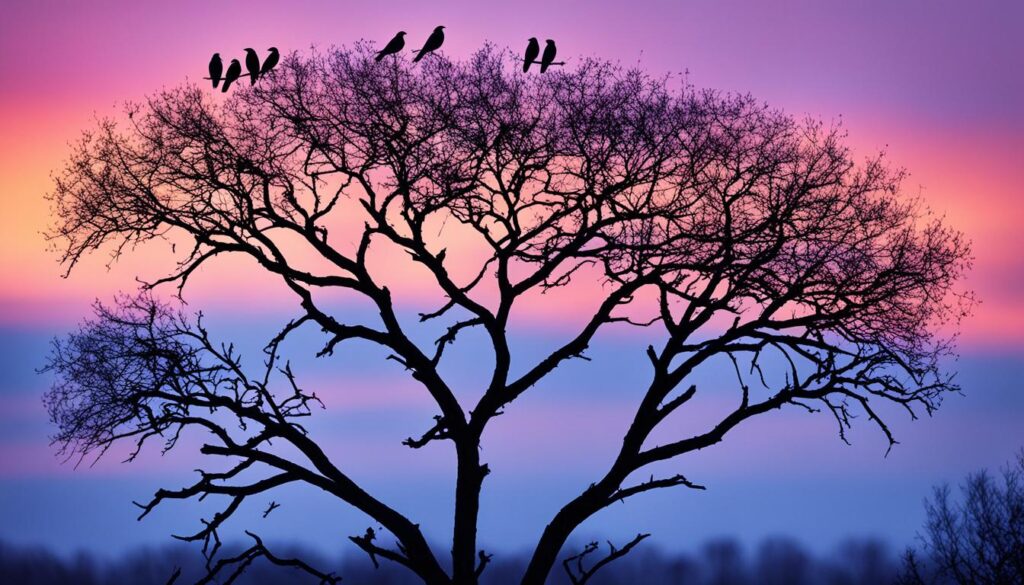
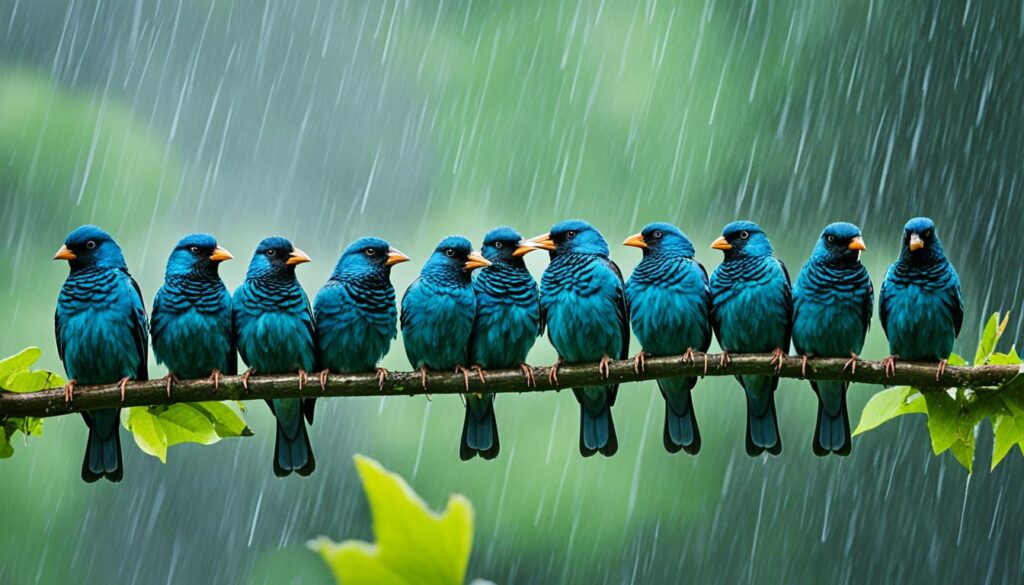
Good day! Do you know if they make any plugins
to assist with SEO? I’m trying to get my website to rank for some targeted keywords but I’m not seeing very good gains.
If you know of any please share. Thanks! You can read
similar article here: Eco blankets
Good day! Do you know if they make any plugins to assist with SEO?
I’m trying to get my blog to rank for some targeted keywords but
I’m not seeing very good gains. If you know
of any please share. Cheers! You can read similar article
here: Your destiny
I am extremely inspired together with your writing talents as smartly as
with the format for your blog. Is this a paid theme or did you customize it your self?
Anyway stay up the nice quality writing, it is rare to peer
a great blog like this one nowadays. Blaze AI!
I am really impressed with your writing talents as smartly as with the
layout on your weblog. Is this a paid topic or did you modify it your self?
Anyway stay up the excellent high quality writing, it’s rare to peer a
nice weblog like this one nowadays. Blaze AI!
I am extremely impressed with your writing skills as neatly as with the format on your blog. Is this a paid topic or did you customize it yourself? Either way stay up the excellent quality writing, it is rare to see a nice weblog like this one today. I like talkbirds.com ! It’s my: Stan Store alternatives
I am really impressed along with your writing talents and also
with the format for your blog. Is this a paid subject
or did you customize it yourself? Either way keep up the nice high quality writing,
it’s uncommon to peer a great weblog like this one today.
Beacons AI!
Thanks for your exciting article. Other thing is that mesothelioma cancer is generally a result of the breathing of fibers from mesothelioma, which is a positivelly dangerous material. It truly is commonly found among employees in the engineering industry who’ve long exposure to asbestos. It can be caused by living in asbestos covered buildings for long periods of time, Family genes plays an important role, and some persons are more vulnerable for the risk in comparison with others.
Music started playing anytime I opened up this web page, so annoying!